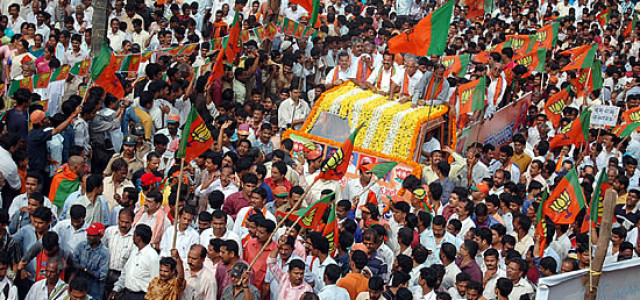Dibyesh Anand, University of Westminster
As India faces the prospect of voting into power in May 2014 of a Hindu majoritarian rightwing Bharatiya Janata Party led by a political leader Narendra Modi, (in)famous for presiding over the massacre of several hundreds of Muslim minorities in his state of Gujarat in 2002, India related scholars face an interesting dilemma. Should scholars remain neutral observers and researchers, documenting and commenting, but never critiquing? Or should they adopt an ethics of responsibility toward the marginalised, minoritised and suppressed and highlight the violence of this phenomenon? Is neutrality desirable or even possible in these fractured times when Indian democracy that is supposed to be secular is likely to have a Prime Minister who came onto the world stage years ago with a nickname ‘butcher of Gujarat’?
Many Indian and India related scholars and academics in the USA and UK for instance have expressed their disquiet with the prospect of Modi becoming the Prime Minister. There has been a heap of criticism, abuse and even threats against them from rightwing trolls on twitter and other social networks. Trolls have called the critics ‘sepoys’, slaves of a Western framework, not analytical enough because of their predominantly humanities and social sciences background, and so on. This cyber bullying and abuse is higher against women.
Those who do not know much about India often fail to appreciate how Modi’s possible victory is a continuity as well as break from the past.Indian nationalism has had its dark side and massacres of religious minorities, adivasis (tribals) and Dalits and the use of violence, including sexual violence, as tool of dominance has been disturbingly frequent and systemic. The Right, the Centre and the Left have all been complicit in various ways with this violent nation-statism.
What makes the BJP and its majoritarian Hindu nationalism much worse is that bigotry is not political opportunism but fundamental to its ideology. The RSS, the militant quasi-fascist movement, that is the parent body of most Hindu rightwing outfits including the BJP and the extremist Bajrang Dal, considers the transformation of the entire Indian state into a Hindu state as its primary goal. For them, the democratic system is a threat but they seek to make use of it through social mobilisation, cultural consolidation and political transformation. They want to convert pluralist and internally contradictory Indian reality into a ‘neat’ new India where a Hindu majority is recognised as having exclusive purchase over the nation, where 175 million plus Muslims have the option of being disenfranchised or expulsion or extermination (‘Pakistan ya Qabirstan’ – ‘expulsion to Pakistan or death’ as the slogan goes), where Christians would be disempowered too (Hindu rightwingers often say this casually ‘pehle kasai, phir isai – ‘first the butchers/Muslims, then the Christians’). They want to take away minority rights and the right to dissent without fear and thus convert democracy into a majoritarian-dominated system.
Narendra Modi is intimately associated with the RSS and his campaign is often run at the grassroots level by their activists. What makes him even more lethal is the bourgeois respectability he has acquired. This is because of his massive corporate backing resulting in the mainstream media, especially the television, acting as his propaganda tool. This also reflects the authoritarian fantasies of the bourgeoisie who see him as efficient and decisive, and as someone who will make India stronger. They conveniently ignore the fact that a Chief Minister who failed to prevent the massacre of around, at least, a thousand people in his State (assuming for a moment that he was not directly or indirectly responsible for fanning the violence) cannot be an efficient or able administrator. This conversion of Modi from the one who presided over a massacre to one who was not directly responsible and then to one who brought rapid development and is the only able, decisive and pro-growth leader in India has been supported by multi-million dollar PR campaigns.
Is it surprising, then, that a few prominent Indian as well as diasporic liberal scholars and intellectuals including Lord Meghnad Desai from LSE and Ashutosh Varshney of Brown University have also started speaking in a different tune? They have expressed their disquiet with overseas critics of Modi, asked us to ‘respect the wishes of Indian electorate’, remember that no Court so far has indicted Modi for ‘Gujarat 2002’, counseled that the violence then was a ‘riot’ (as if there were two sides) and not a ‘pogrom’ and then asserted that Modi in his current avatar is not divisive but someone who has shifted from identity politics to a politics of development.
What makes this change of heart of Desai and Varshney disturbing is that it is based on a forgetting of their own position critical of the Hindu Right in the past. One could easily see in their political shift an opportunist approach toward secularism – defend secularism as integral to the idea of India when Modi is being criticised everywhere and it is easy to do so, but jump ship when Modi is close to power and sing to a different tune. Unless intellectuals rejecting the Modi critics acknowledge that they were themselves wrong in their assessment of him in 2002, that their research or ideas have changed over time, there is no credibility in their arguments today. Defence of secular democracy cannot simply be a convenient skin to wear or shed depending on the political climate. It is difficult to see a public intellectual calling for a forgetting of massacres of hundreds of people under the watch of a political leader and then ‘moving on’ as anything other than an apologist for authoritarianism and its injustices.
Dibyesh Anand is the Head of Department of Politics and International Relations and Reader (Associate Professor) in International Relations at the University of Westminster and the author of Hindu Nationalism in India and the Politics of Fear.
